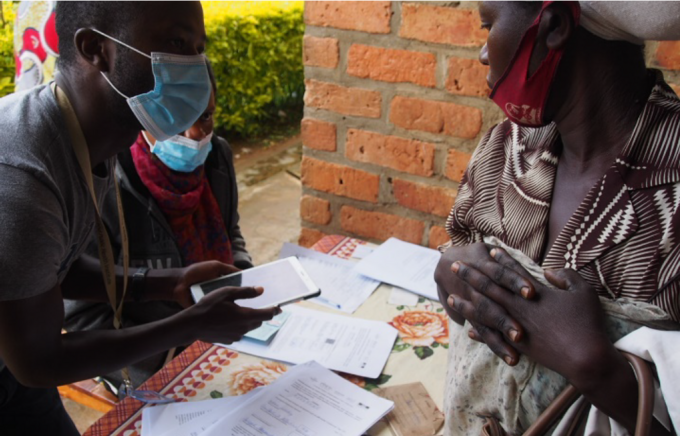DYNAMIC: New Clinical Decision Support Tool Reduces Antibiotic Prescription in Children by a Four-fold
14.06.2021
A pilot study conducted in Tanzania and Rwanda has demonstrated that the quality of care for sick children is improved through the use of clinical decision support algorithms. These algorithms, which have been designed by medical experts through an innovative digital platform called medAL-creator, could prevent millions of unnecessary prescriptions of antibiotics each year in Africa, and potentially in Europe. The study is led by the Centre for Primary Care and Public Health (Unisanté) and the Swiss Tropical and Public Health Institute (Swiss TPH) in collaboration with research partners in the implementing countries.

Joseph Hbakurama, a research nurse in Rwanda, presents the DYNAMIC study to a mother interested in participating. © Ludovico Cobuccio
Every year, an estimated 3.3 million children die from acute febrile episodes, particularly in low- and middle-income countries (LMICs). This situation is mainly due to the lack of diagnostic tools and clinical guidance for frontline health workers. As a result, more than 6 in 10 children attending primary care facilities in Africa receive an antibiotic prescription, while only 2 in 10 actually need one. On average, 5-year-old children have received 25 antibiotic treatments since the day they were born.
Inappropriate use of antibiotics is the main driver of antibiotic resistance, which is one of the top global public health threats facing humanity, as declared by the World Health Organization (WHO). During an outbreak, young children are the first victims of resistant infections for which first-line antibiotics no longer work. To address this issue, the DYNAMIC project was created in order to improve the quality of care for children and adolescents (0-14 years) in LMICs through the implementation of clinical decision support algorithms and point-of-care tests that help guide and train health workers in the management of sick children.
DYNAMIC is funded by the Fondation Botnar and the Swiss Agency for Development and Cooperation (SDC). The funding amount of CHF 10 Million over five years allows Unisanté and Swiss TPH, in collaboration with the Swiss Federal Institute of Technology Lausanne (EPFL), the Ifakara Health Institute (IHI), the National Institute for Medical Research (NIMR), the Rwanda Biomedical Centre (RBC) and public health authorities of these countries to develop and validate new clinical decision support algorithms, for further implementation at scale.
Pilot study with nearly 500 children: a success story
The algorithms, known as ePOCT+, guide clinicians on whether or not to prescribe antibiotics through the use of a tablet-based app. A pilot study was conducted in March 2021 with 474 children and adolescents in Tanzania and Rwanda, and found that prescriptions dropped from 70% in Rwanda and 63% in Tanzania to 13% and 19% respectively when using ePOCT+. This was the first real-life evaluation of the tool.
"The tool we developed had a strong effect on protecting children from unnecessary antibiotics, even in real health facility conditions,” said Honorati Masanja, Director of the Ifakara Health Institute and project lead in Tanzania. “We will now further evaluate its impact to provide relevant information to health authorities in view of a potential national scale-up."
ePOCT+: the third generation of innovative algorithms
Building on the experience gathered from two previous versions of the algorithm, ePOCT+ expands the clinical content to include young infants up to young adolescents to allow clinicians to manage all paediatric cases presented to primary care facilities. The clinicians are guided on which symptoms, signs and tests to assess in order to determine the correct diagnosis and treatment. ePOCT+ is widely appreciated by clinicians who have described the tool as easy to use and leading to better healthcare.
“The DYNAMIC project illustrates the virtues of reverse innovation,” said Valérie D'Acremont of Unisanté and Swiss TPH and lead of the DYNAMIC project. “What we are doing in the South provides experience that can benefit countries in the North like Switzerland. We are already seeing this when it comes to the CoronaCheck and CoronaVax tools we developed to manage the COVID-19 crisis. African health systems are new when compared to the Swiss system, and are thus more agile and flexible.”
Innovative public health tool
“The success of ePOCT+ shows that digital innovative tools can contribute to improving the prescription of antibiotics and mitigating the development of antibiotic resistance at an individual and population level,” said Kaspar Wyss, Deputy Director of Swiss TPH. “Thus, the tool has the potential to lead to better health outcomes for children in Africa, and potentially Europe in the future.”
ePOCT+ was developed in close collaboration with the Tanzanian and Rwandan governments and end-user feedback from local clinicians, and adapted to the specific needs of the respective countries. As a next step in the DYNAMIC project, a 2-year clinical study in around 80 health centres in Tanzania and Rwanda will soon begin to consolidate these preliminary findings.
Revolutionising clinical algorithms
MedAL-creator, an innovative digital platform powering the DYNAMIC project, was developed by a multi-disciplinary team at Unisanté. The platform will empower local medical experts to rapidly create and modify clinical algorithms without the need of IT development skills. The ability to rapidly integrate relevant data-driven and clinically validated algorithm suggestions made by machine-learning models will allow the project to become truly dynamic.
Stay connected
Subscribe to our newsletter and get all the latest research news, project updates, course and event listings from Swiss TPH.